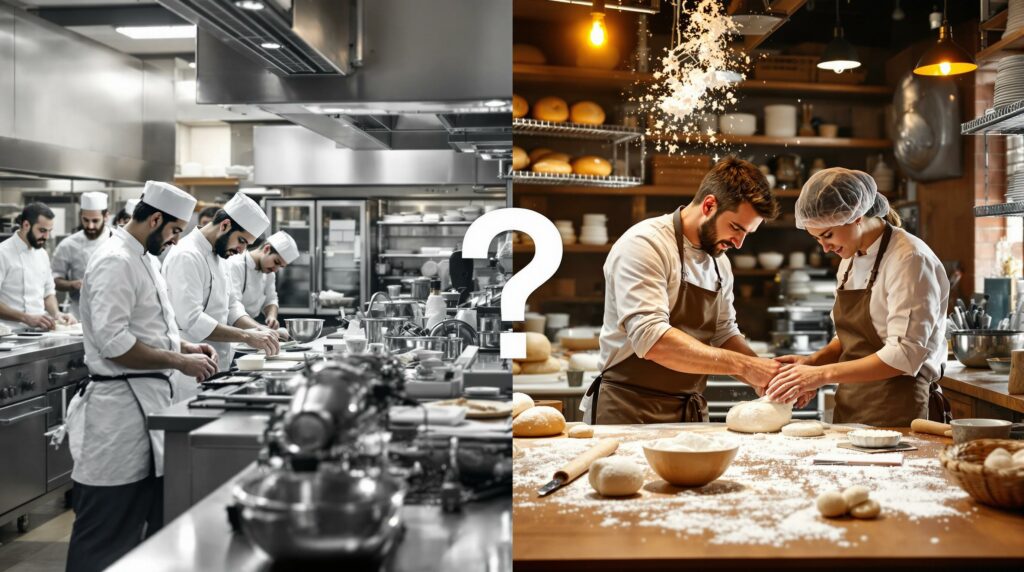You’ve discovered a deep passion for baking. The scent of fresh bread, the beauty of a perfectly frosted cake, the satisfaction of transforming simple ingredients – it calls to you, not just as a hobby, but as a potential career. You’re “Bakery Bound”! But what’s the best way to turn that dream into a professional reality? How do you acquire the skills, knowledge, and experience needed to thrive in the demanding yet rewarding world of professional baking?
Two primary pathways typically emerge for aspiring bakers seeking formal training: enrolling in a culinary school with a specialized baking and pastry arts program, or pursuing a traditional apprenticeship or intensive on-the-job training within a working bakery or kitchen. Both routes can lead to successful careers, but they offer vastly different learning experiences, costs, time commitments, and potential outcomes. Choosing the right path is a critical first step, and understanding the pros and cons of each is essential for making an informed decision that aligns with your goals, learning style, and circumstances.
Defining the Paths: School vs. Hands-On Learning
Let’s clarify what each path generally entails:
- Culinary School (Baking & Pastry Arts Programs): These are formal educational institutions offering structured programs that typically lead to a certificate, diploma, or associate’s degree. The curriculum usually balances practical lab classes (where students practice techniques in teaching kitchens) with theoretical instruction (covering baking science, math, sanitation, safety, ingredient identification, and sometimes management principles). Programs vary in length from several months to two or more years and almost always involve significant tuition fees and associated costs.
- Apprenticeship / On-the-Job Training (OJT): This involves learning the craft directly within a functioning commercial environment – a bakery, restaurant, hotel kitchen, etc. – under the guidance of an experienced baker or pastry chef (the mentor). The focus is heavily on practical, hands-on skill development specific to that establishment’s production needs. Apprentices typically earn a wage (though often starting low) while learning. The training is less formalized, more experiential, and the duration can vary depending on the program or establishment.
Culinary School: The Structured Classroom Approach
Formal schooling offers a comprehensive, organized way to learn the fundamentals.
Pros:
- Broad Curriculum & Foundational Knowledge: Culinary schools generally expose students to a wide array of baking and pastry disciplines – yeast breads, laminated doughs, cakes, cookies, chocolates, sugar work, plated desserts, etc. This provides a broad, well-rounded foundation. You also typically receive in-depth theoretical instruction in baking science (understanding the “why” behind techniques), sanitation protocols (ServSafe certification often included), recipe costing, and potentially purchasing and management skills.
- Structured Learning Environment: Offers a clear curriculum, defined learning objectives, step-by-step instruction from professional chef instructors, and graded assessments. You learn in dedicated teaching kitchens with access to a range of professional equipment, often without the intense pressure of immediate commercial production.
- Networking Opportunities: Provides valuable connections. You network with instructors (who often have extensive industry experience and contacts), fellow students (your future colleagues and network), and potential employers through career fairs, guest lectures, or the school’s reputation.
- Formal Credentials: Graduating earns you a certificate, diploma, or degree. This formal credential can be advantageous on a resume, particularly when applying for positions in larger institutions like hotels, resorts, cruise lines, or corporate environments that may value formal qualifications.
- Career Services & Externships: Many reputable schools have dedicated career services departments that assist with resume writing, interview skills, and job placement. They often facilitate externships (short internships), providing valuable initial real-world experience and potential job offers.
Cons:
- Significant Cost: This is often the biggest barrier. Tuition for quality baking programs can be very expensive, often running into tens of thousands of dollars. Added costs include uniforms, toolkits, books, lab fees, and potentially housing and living expenses. Many graduates start their careers burdened with substantial student loan debt.
- Time Commitment: Programs require a dedicated time commitment, ranging from intensive six-month courses to two-year associate’s degree programs, often requiring full-time attendance.
- “School Bubble” vs. Real World: While labs simulate work, the classroom environment doesn’t fully replicate the intense speed, high volume, long hours, and daily pressures of a working commercial bakery or kitchen. The transition can still be demanding.
- Breadth Over Depth (Potentially): By covering a wide range of topics, some programs may provide less in-depth mastery of one specific area compared to someone who apprentices solely in, say, artisan bread or high-end plated desserts.
- Theory/Practice Gap: Graduates possess strong theoretical knowledge but may initially lack the speed, efficiency, and specific production experience employers seek for immediate high-level contribution. There’s often still a learning curve upon entering the workforce.
Apprenticeship: Learning by Doing in the Real World
The age-old method of learning a craft by working alongside a master offers a different set of benefits and drawbacks.
Pros:
- Immersive Practical Experience: You learn essential skills through direct, hands-on application in a real working environment from day one. Repetition under production conditions builds speed, efficiency, and muscle memory.
- Earn While You Learn: Unlike accumulating debt at school, apprentices typically receive wages for their work. While starting pay is often minimum wage or slightly above, you are earning an income while gaining valuable training, avoiding student loans.
- Deep Specialization: If you apprentice at a high-quality artisan bread bakery, you have the opportunity to become deeply skilled in that specific craft. You learn the nuances of fermentation, shaping, and baking specific products to a high standard.
- Direct Mentorship: Working closely with an experienced baker or pastry chef provides personalized guidance, immediate feedback, and invaluable insights into the craft and the industry. A good mentor can significantly shape your career.
- Real-World Acclimation: You immediately learn to work under pressure, meet production deadlines, troubleshoot real-time problems, and function as part of a kitchen team – skills essential for career longevity.
- Potential Job Offer: Bakeries often invest in apprentices with the hope of hiring them full-time upon completion of their training. It can be a direct pipeline to employment.
Cons:
- Narrower Scope of Training: Your learning is often limited to the specific products, techniques, and equipment used by that particular establishment. An apprentice at a bread bakery might gain little to no experience with cake decorating or chocolate work, for example.
- Variable Quality of Training: The quality and comprehensiveness of an apprenticeship depend heavily on the establishment and the mentor. Some places may exploit apprentices for cheap labor, focusing on repetitive basic tasks (scaling, cleaning, prep) with limited opportunities for advanced learning. There’s often no formal curriculum or guarantee of exposure to all aspects of the craft.
- Lack of Formal Theory: While you learn how to do things, you might not always learn the underlying baking science or theory (the “why”) unless your mentor makes a specific effort to teach it. Formal knowledge of sanitation, costing, or management might be limited.
- Potentially Long Hours & Low Pay: Bakery work often involves very early mornings, long hours, and physically demanding tasks, especially for apprentices who may start with less desirable shifts and lower wages.
- Limited Formal Networking: Your professional network initially might be confined to the colleagues within your specific workplace.
- No Formal Credential: You gain invaluable experience but don’t receive a diploma or degree, which could be a disadvantage for certain types of employers or career paths later on, though strong practical experience is highly valued in many sectors.
Factors to Consider When Choosing Your Path
The “best” path isn’t universal; it depends on you. Reflect on these factors:
- Your Learning Style: Do you learn best in a structured classroom with lectures, demonstrations, and assigned practice? Or do you absorb information more effectively through hands-on repetition and direct observation in a working environment?
- Financial Reality: Can you realistically afford the substantial cost of culinary school, potentially taking on debt? Or is earning an income while learning, even if modest initially, a financial necessity?
- Ultimate Career Goals: What kind of baking job do you envision? Working in a large hotel, resort, or corporate setting might favor a culinary degree. Landing a job at a respected local artisan bakery might prioritize demonstrated practical skills and experience, potentially gained through apprenticeship. Do you want a broad foundation first, or to specialize early?
- Time Commitment & Availability: Can you dedicate yourself to a full-time (or even part-time but structured) school program for months or years? Or does the schedule and immediate immersion of an apprenticeship better suit your life circumstances?
- Local Opportunities & Research: What options are actually available to you? Research culinary schools in your area – look at their curriculum, instructor credentials, graduate placement rates, and costs. Also, investigate local bakeries or pastry shops – do they have a reputation for training staff well? Are they willing to take on genuine apprentices, or just hire for basic prep roles? Talk to people working in the industry locally.
- Self-Discipline: Formal schooling provides structure and deadlines. An apprenticeship often requires more self-motivation to ask questions, seek out learning opportunities beyond assigned tasks, and potentially supplement practical learning with independent study of theory.
Can You Combine Paths?
It’s not always an either/or choice. Many successful bakers forge hybrid paths:
- Attend a shorter, focused certificate program at a culinary school, then seek an entry-level position or apprenticeship to gain practical experience.
- Start with an entry-level job (e.g., baker’s assistant, dishwasher) in a quality establishment to get a foot in the door and observe, then potentially pursue an apprenticeship there or use the experience to apply to school.
- Gain practical experience through work/apprenticeship, then later attend specialized workshops or advanced courses at a culinary school to learn specific techniques (e.g., advanced chocolate work, sugar artistry).
Conclusion: Choosing Your Route to Being Bakery Bound
Both formal culinary education and hands-on apprenticeships offer valid and potentially rewarding pathways into a professional baking career. Culinary school provides a structured, comprehensive foundation with broad exposure and theoretical knowledge, but comes at a significant financial cost and requires adaptation to real-world pressures. Apprenticeships offer invaluable practical experience, earn-while-you-learn potential, and deep specialization, but the scope and quality of training can be variable, and theoretical knowledge might be lacking.
There is no single “right” answer. The ideal path depends entirely on your individual learning preferences, financial situation, long-term career aspirations, and the specific opportunities available to you. Do your research, talk to bakers who have taken different routes, and honestly assess your own strengths and goals. Whether you choose the structured environment of the classroom or the dynamic learning curve of the working kitchen bench, remember that success in this field ultimately requires passion, dedication, a strong work ethic, a continuous desire to learn, and the resilience to handle the pressures (and early mornings!) of the bakery life. Choose the path that best sets you up for success on your exciting journey to being truly “Bakery Bound.”







